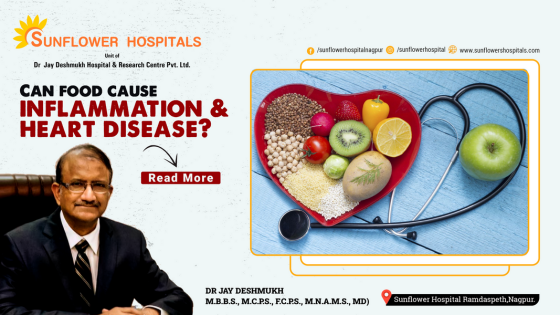How do these diets help?
They reduce the incidence of heart attacks by improving risk factors like cholesterol and blood pressure. These diets also reduce inflammatory changes in blood vessels and prevent premature and aggressive atherosclerosis. Rather than focusing on specific foods, it is best to include a variety of fruits, vegetables, whole grains and healthy oils in your diet. These would help to lower inflammation in important blood vessels.
In which diseases are the benefits of anti-inflammatory effects due to dietary changes commonly seen?
The evidence that trying to minimise inflammation through dietary changes reduces the risk of diseases is strongest for arthritis, gastrointestinal and heart health and possibly autoimmune diseases. This evidence has been highlighted by Liz Moore from Harvard Medical centre
What are the foods that promote inflammation?
White bread, pastries, sweet Cereals and white rice are all refined carbohydrates. Sweets, glucose biscuits may have processed sugars that promote inflammation. Fried foods like chips, samosas, and pizzas are pro-inflammatory. Red meat, beef bacons, are also known to cause inflammation. Those with lactose intolerance can have inflammatory properties. with milk, butter and cheese. Excess beer, liquor and artificial food dyes, preservatives and Monosodium Glutamate, a common food additive and flavour enhancer, have pro-inflammatory effects.
How do we shift from your usual diet to the new dietary pattern?
According to Ms Moore do not try to suddenly switch to a new eating style. Start by slowly making changes so that these become more of a lifestyle shift rather than going on a diet. Try to eat fewer foods that come from packages and more that come from the ground.
Do anti-inflammatory diets work? How do you know that they are having a positive impact on your health?
Anti inflammatory diet that would also include green tea and dark chocolate that contains more than 70% cocoa would reflect on your body in a matter of a few weeks if followed correctly. This would lead to clearer skin, decreased muscle or joint pain, decreased swelling in your hands and feet, fewer headaches, decreased gas, indigestion, improvement in sleep, less anxiety, stress and brain fog, less bloating, better blood pressure and blood sugar control and weight loss.
What are anti-inflammatory foods, and how do they help?
It is believed that antioxidants in brightly coloured fruits and vegetables like tomatoes, carrots and squash may lessen the effects of free radicals that damage cells.
How to start an anti-inflammatory diet?
It is important to understand that the food you take on a daily basis can lead to chronic inflammation. Certain foods like blueberries, olive oil, spinach, green tea, turmeric and oily fish may have anti-inflammatory effects.
Which eating patterns are known to reduce inflammatory response?
The best evidence comes from population studies of whole diets. These studies indicate that eating patterns that are rich in fruits, vegetables, whole grains, unsaturated oils, beans, nuts and fish, such as the DASH diet ( DIETARY APPROACHES TO STOP HYPERTENSION) and Mediterranean diets, lower heart disease risk.
What are the other food components that may help fight inflammation?
Fibre found in fruits, vegetables and especially legumes and whole grains such as barley, oats and bran. Omega 3 fatty acids are found in fish, vegetable oils such as flaxseed Anand canola, walnuts, flaxseeds and green leafy vegetables. Polyphenols that are plant chemicals found in berries, dark chocolate, tea, apples, citrus, onions, soybeans and coffee have anti-inflammatory effects. Unsaturated fats found in almonds, walnuts, pumpkin and sesame seeds and plant oils as olive oil, peanut oil and canola also have anti inflammation as their important properties.
Author: Dr Jay Deshmukh
Dr Jay Deshmukh is Chief Physician and Director, Sunflower Hospital, Nagpur Honorary Physician to Honorable Governor of Maharashtra and PondicherryCentral. Dr Jay Deshmukh is an M.B.B.S., M.C.P.S., F.C.P.S., M.N.A.M.S., MD From Internal Medicine – Bombay and New Delhi.


